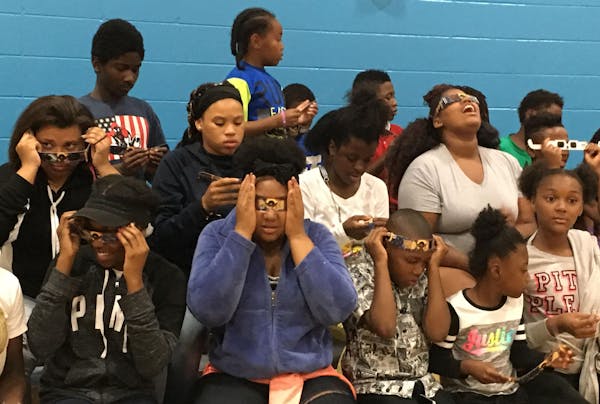With the solar eclipse quickly approaching, eclipse viewing glasses are in high demand. But NASA warns that some might be unsafe.
Many glasses do not have lenses that are certified by the International Organization for Standardization, meaning their lenses may not provide adequate protection from looking directly at the sun, according to NASA.
The total solar eclipse, the first to cross the entire continental U.S. since 1918, will occur on Aug. 21. Looking at it without proper protection could cause serious and permanent damage to your eyes.
NASA recommends buying eclipse viewing glasses from just five companies: American Paper Optics, Baader Planetarium, Rainbow Symphony, Thousand Oaks Optical and TSE 17. NASA also recommends that eclipse viewers ensure that the ISO certification number 12312-2 and the manufacturer's identity are printed on the glasses.
Solar eclipse glasses can be bought in stores, including some Walmart and Lowe's Home Improvement locations, according to the American Astronomical Society, which helped NASA compile a list of reputable manufacturers.
But glasses from companies not recommended by NASA are readily available online, where it is sometimes hard to tell the difference between safe and potentially risky glasses.
A quick Amazon.com search revealed the danger. Among the results in a search for "solar eclipse glasses," none of the five "sponsored" products were manufactured by one of the NASA-recommended companies. Of the eight "bestseller" glasses that turned up, half of them were from NASA-approved manufacturers — or so they claimed.
The online news outlet Quartz reported that some of the American Paper Optics glasses sold on Amazon are counterfeit. A key identifier is the shape of the earpieces: authentic APO glasses have a squared-off earpiece shape, while counterfeit APO products may have rounded ears, according to Quartz.
Many Amazon reviewers are complaining that the glasses they received do not match the certification description on the site.
"Unfortunately, we trusted the description on Amazon, but the glasses have no markings as to certification or manufacturer," reads a one-star review. "The package says they are certified and made in China. They may be safe, but there is no way to know for sure."
Live video of man who set himself on fire outside court proves challenging for news organizations
4/20 grew from humble roots to marijuana's high holiday

